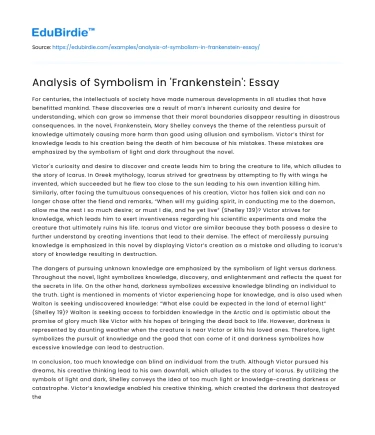For centuries, the intellectuals of society have made numerous developments in all studies that have benefitted mankind. These discoveries are a result of man’s inherent curiosity and desire for understanding, which can grow so immense that their moral boundaries disappear resulting in disastrous consequences. In the novel, Frankenstein, Mary Shelley conveys the theme of the relentless pursuit of knowledge ultimately causing more harm than good using allusion and symbolism. Victor’s thirst for knowledge leads to his creation being the death of him because of his mistakes. These mistakes are emphasized by the symbolism of light and dark throughout the novel.
Victor's curiosity and desire to discover and create leads him to bring the creature to life, which alludes to the story of Icarus. In Greek mythology, Icarus strived for greatness by attempting to fly with wings he invented, which succeeded but he flew too close to the sun leading to his own invention killing him. Similarly, after facing the tumultuous consequences of his creation, Victor has fallen sick and can no longer chase after the fiend and remarks, “When will my guiding spirit, in conducting me to the daemon, allow me the rest I so much desire; or must I die, and he yet live” (Shelley 139)? Victor strives for knowledge, which leads him to exert inventiveness regarding his scientific experiments and make the creature that ultimately ruins his life. Icarus and Victor are similar because they both possess a desire to further understand by creating inventions that lead to their demise. The effect of mercilessly pursuing knowledge is emphasized in this novel by displaying Victor’s creation as a mistake and alluding to Icarus’s story of knowledge resulting in destruction.
Save your time!
We can take care of your essay
- Proper editing and formatting
- Free revision, title page, and bibliography
- Flexible prices and money-back guarantee
The dangers of pursuing unknown knowledge are emphasized by the symbolism of light versus darkness. Throughout the novel, light symbolizes knowledge, discovery, and enlightenment and reflects the quest for the secrets in life. On the other hand, darkness symbolizes excessive knowledge blinding an individual to the truth. Light is mentioned in moments of Victor experiencing hope for knowledge, and is also used when Walton is seeking undiscovered knowledge: “What else could be expected in the land of eternal light” (Shelley 19)? Walton is seeking access to forbidden knowledge in the Arctic and is optimistic about the promise of glory much like Victor with his hopes of bringing the dead back to life. However, darkness is represented by daunting weather when the creature is near Victor or kills his loved ones. Therefore, light symbolizes the pursuit of knowledge and the good that can come of it and darkness symbolizes how excessive knowledge can lead to destruction.
In conclusion, too much knowledge can blind an individual from the truth. Although Victor pursued his dreams, his creative thinking lead to his own downfall, which alludes to the story of Icarus. By utilizing the symbols of light and dark, Shelley conveys the idea of too much light or knowledge-creating darkness or catastrophe. Victor’s knowledge enabled his creative thinking, which created the darkness that destroyed the light in his life. Shelley utilizes allusion and symbolism to emphasize that the merciless pursuit of knowledge can be self-destructive.






 Stuck on your essay?
Stuck on your essay?

